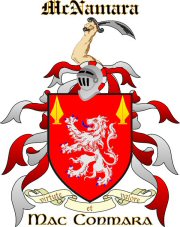| Home | Index |
| MacNAMARA
In Co. Clare, the homeland of the MacNamaras, the name is very
numerous. In fact in everyday speech it is usually abbreviated to simple
Mac: this is interesting, because another Mac name, MacMahon, comes
first in the numerical list of Co. Clare names, considerable ahead of
MacNamara, which has second place, yet the abbreviation is never applied
to MacMahon. The sept of MacNamara was, after the O'Briens, the most
important and powerful of the Dalcassians of Thomond. They were
hereditary marshals to the O'Briens and had the privilege of
inaugurating the chief of the O'Briens who was, of course, often a king.
The sept was originally confined to a small territory, but by the end of
the eleventh century they had become lords of Clancullen (which
comprises a great part of East Clare) and they are so described by the
Four Masters many times at various dates between 1099 and 1600. The sept
in due course became two-the chief of West Clancullen (barony of
Bunratty) being MacNamara Fyne (i.e. fionn, fair), and the chief of East
Clancullen (baronies of Upper and Lower Tulla) MacNamara Reagh (i.e.
riabhach, swarthy or grizzled). They were to a great extent dispossessed
in the Cromwellian debacle, but one family, resident until quite lately
at Ennistymon, became Protestants and were extensive landlords up till
the Land Act of 1903. The history of Clare is full of the name MacNamara
: among other notable acts they founded the Franciscan Abby of Quin in 1402. Sept describes a group of persons who or whose immediate and
known ancestors bore a common surname and inhabits the same locality. Oddly enough in County Clare though MacMahon considerably
outnumbers MacNamara it is invariably the latter which is indicated by
the use of ordinary parlance of the plain Mac as an abbreviation: indeed
so usual is this that it is often written in the abbreviated form,
generally with the addition of the K-Mack. From the book IRISH FAMILIES Their Names, Arms and Origins, by Edward MacLYSAGHT, Allen Figgis : Dublin 1972 |
| Home | Articles Index |
 __________
__________